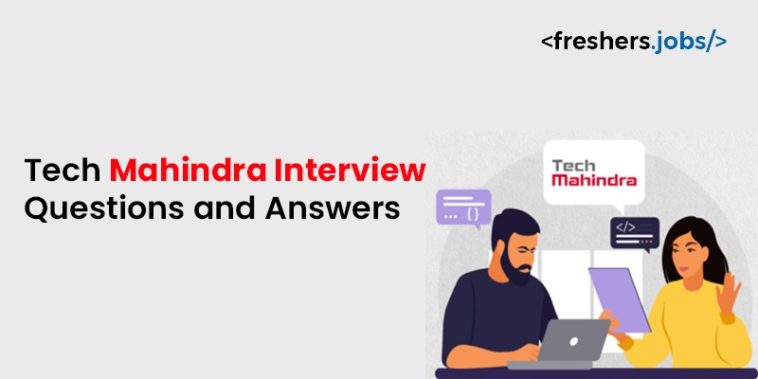Tech Mahindra, a multinational technology corporation headquartered in India, specializes in Information Technology (IT) and Business Process Outsourcing (BPO). The company is based in Pune and has its registered office in Mumbai. It operates as a subsidiary of the Mahindra Group. As of April 2020, Tech Mahindra was a company with a revenue of $5.2 billion and a workforce of over one hundred thousand employees in 90 countries worldwide.
Tech Mahindra secured the fifth position among India’s IT firms and placed forty-seventh overall in the Fortune India 500 list for 2019. On June 25, 2013, Tech Mahindra announced the successful merger with Mahindra Satyam. As of April 2020, Tech Mahindra boasted a clientele of more than nine hundred active clients. In this blog, we will explore the tech mahindra interview questions with the answers to guide the graduates who are seeking freshers jobs, along with the interview process.
Eligibility Criteria
Tech Mahindra’s eligibility criteria for freshers align closely with those of many other companies. It’s advisable to take a look at both the Graduation criteria and Academic Criteria for the Tech Mahindra recruitment process before submitting your application. These are the Eligibility Criteria a candidate must have to get through the tech mahindra recruitment process.
Tech Mahindra offers a wide range of job vacancies for freshers. Interested Candidates can click on Tech Mahindra Jobs For Freshers to apply for various job roles relevant to their skills and abilities.
- Graduation Criteria: You should have a Bachelor’s degree in Engineering (B.E.) or Technology (B.Tech) in any of the following fields, like CSE, ECE, IT, EEE, TELECOM, or EI. You may also be eligible if you completed an M.Sc. degree in CS and IT with at least 60% minimum requirement.
- Academic Criteria: To be eligible for employment at Tech Mahindra, candidates are required to have a minimum of sixty per cent or higher marks in their 10th and 12th grades (or diploma) with no backlogs.
- General Criteria (Skills): Candidates aspiring to work at Tech Mahindra are expected to possess several essential skills, like exceptional communication and interpersonal abilities, profound technical domain knowledge, a professional work attitude, and strong aptitude skills.
Interview Process
The interview process at Tech Mahindra for freshers closely resembles that for experienced candidates, with the main differences lying in the level of question complexity and the number of interview rounds involved. For freshers, the interview process often features questions related to their entry-level knowledge and skills. These questions are designed to assess their foundational understanding of core concepts related to their field of study or the specific job opportunity they are applying for. The aim is to recognize their potential to learn and adapt to the company’s work culture. Freshers might go through a relatively streamlined process with fewer rounds, focusing on assessing their fundamental skills and cultural fit. If you are in search of job openings in Bangalore, you can look for job openings available in that city. Visit fresher job openings in Bangalore to find job positions that are relevant to their skills and abilities.
Interview Rounds
Interview Rounds in Tech Mahindra consist of a Written Test, a Psychometric Test (Optional), a Technical Written Test, a Technical Interview, and an HR Round.
Round 1 (Written Test): In the initial phase of the tech mahindra recruitment Process, candidates encounter the first round, which involves a written test aimed at assessing their Aptitude and Technical proficiency. This test comprises three distinct sections:
- Aptitude
- English Essay Writing
- Technical Evaluation
It’s important to note that the first round serves as an elimination stage, where only a predetermined number of candidates, determined by the company, will advance to the next round.
Round 2 (Psychometric Test) (optional): Within the Tech Mahindra interview process, candidates who successfully progress beyond Round one are subjected to a Psychometric Test. This stage involves a personality psychometric assessment designed to evaluate work-related behavior. Importantly, this phase is not elimination-based. During the Psychometric Test, candidates are presented with an online written assessment comprising approximately eighty questions. They are allotted a timeframe of approximately 20 to 30 minutes to complete this examination.
Round 3 (Technical Written Test): In the tech mahindra interview process, Round 3 involves another written examination aimed at evaluating a candidate’s technical proficiency and aptitude. This round encompasses various sections that candidates need to complete within a two-hour timeframe:
- Analytical and Numerical Ability
- Software Testing Methodologies
- Data Structures and Algorithms
- Pseudo Code
- Linux
- Software Testing Concepts
- Database Query Languages like SQL (Structured Query Language)
- Fluid Intelligence
- Hands-on Programming
It’s essential to note that Round 3 follows an elimination format, meaning that candidates must perform well in this round to continue in the selection process.
Round 4 (Technical interviews): In this part of the tech mahindra interview process, candidates can expect questions from their academic studies. To successfully navigate this stage, a strong grasp of Computer Science fundamentals is required. Candidates should possess knowledge in various areas, including data structures, algorithms, database management systems, operating systems, networking, object-oriented programming principles, and proficiency in a programming language of their choice, such as C++, Java, Python programming, and more. Candidates from disciplines other than computer science should prepare for questions related to their specific field of study. During the interview, Computer Science candidates can expect coding challenges to test their programming abilities. Additionally, the panel may inquire about the details provided in the candidate’s resume, so thorough familiarity with one’s Curriculum Vitae is essential. This round may also include questions of a puzzle-solving nature.
Round 5 (HR Round): After successfully navigating the technical interviews, candidates proceed to the final HR (Human Resource) Round. This stage primarily focuses on behavioral questions to assess the candidate’s compatibility with the company’s culture. Maintaining a pleasant and confident attitude should be your objective. It’s essential to keep a smile throughout the interview, as these sessions can be lengthy. This marks the conclusion of the hiring process, and it’s important for candidates to demonstrate adaptability during this stage, although it also provides an opportunity for negotiation. Here are some sample technical mahindra interview questions frequently posed during this round:
- Tell me about yourself.
“I’m a recent graduate with a [mention your degree] from [mention your university/college]. During my academic journey, I developed a strong foundation in [mention relevant subjects or coursework], which was the reason for my passion for [mention your field or area of interest, e.g., software development, data analysis]. I also actively participated in extracurricular activities, such as [mention any relevant clubs, projects, or leadership roles]. These experiences taught me valuable teamwork skills and time management skills.”
- What motivates your interest in pursuing a career in the field of information technology?
“I’m genuinely excited about the field of information technology for several reasons. It’s a dynamic and ever-evolving industry that continuously presents new challenges and opportunities for innovation. This constant evolution means that I’ll have the chance to keep learning and growing throughout my career.”
- Why do you want to work at Tech Mahindra?
“I’m excited about the prospect of working at Tech Mahindra for several compelling reasons. Firstly, Tech Mahindra has a strong reputation for innovation and excellence in the IT industry. I’ve been particularly impressed by the company’s commitment to staying up-to-date with the technological advancements, which aligns perfectly with my passion for continuous learning and growth.”
- Would you be willing to move to different locations across India if required?
“I am absolutely open to relocating to different locations across India as needed for the job. I view it as an opportunity to gain diverse experiences, explore new places, and contribute effectively to the organization’s goals. I’m excited about the prospect of adapting to different environments and embracing new challenges as part of my professional journey.”
- What salary expectations do you have?
“When it comes to salary expectations, I’m primarily focused on finding the right opportunity to start my career and gain valuable experience. I trust that Tech Mahindra offers competitive compensation packages that align with industry standards and the role’s responsibilities. My primary goal is to contribute effectively to the company’s success, and I’m confident that the compensation offered will reflect my skills and contributions as I progress in my career.”
Responding to all these tech mahindra interview questions can be complex. You might consider asking about the company’s typical salary increments or policies.
Technical Interview Questions
- What is the difference between
- #include <file>
- #include “file”
The primary distinction between the two lies in where the preprocessor looks for the included file. When encountering #include “file” the preprocessor looks for “file” in the same directory as the file containing the directive. This is typically employed when integrating header files generated programmatically. Conversely, when encountering #include <file>, the preprocessor typically seeks “file” in predefined search directories established by the compiler or Integrated Development Environment (IDE) rather than necessarily in the same directory as the file containing the directive. This approach is commonly utilized to incorporate standard library header files.
- State the difference between
- call by value
- call by reference
Call by Value: In the Call by Value approach, the values of individual variables from the calling function are passed into corresponding placeholder variables within the called function. In the Call by Value method, it is not possible to modify the values of the original variables through function calls.
Call by Reference: In Call by Reference, the addresses of the calling function’s actual variables are copied into the called function’s dummy variables. We can change the actual values of variables through function calls.
The above-mentioned are the differentiation types of tech mahindra interview questions typically asked in the Technical Round during an Interview Process.
- What is Function Overloading?
Object-oriented programming incorporates a useful feature known as Function Overloading, which permits multiple functions to share the same name while having distinct sets of parameters. Function Overloading arises when a single function name is assigned multiple responsibilities. In Function Overloading, the function name remains consistent, but the arguments it accepts differ. In C++, polymorphism is a feature that facilitates function overloading. Below, we provide an illustration of function overloading in C++.
#include <bits/stdc++.h>
using namespace std;
void foo(int n) {
cout << ” Integer Value: ” << n << endl;
}
void foo(double n) {
cout << ” Decimal Value ” << n << endl;
}
void foo(char n) {
cout << ” Character Value” << nc << endl;
}
int main() {
foo(40);
foo(452.144);
foo(“A”);
return 0;
}
- Can you list some programming languages that follow the Object-Oriented Programming paradigm?
Listed below are some Object Oriented Programming languages:
- C++
- Java
- Python
- PHP
- JavaScript.
- What is Structured Programming?
Structured Programming is a programming approach characterized by a well-organized control flow. It emphasizes the use of structured constructs like “if/then/else” statements, loops (such as “while” and “for” loops), block structures, and subroutines, each of which adheres to specific rules and possesses a defined control flow. Structured programming principles are applicable across various programming paradigms, including Object-Oriented Programming (OOP).
In conclusion, preparing to respond to tech mahindra interview questions requires a solid understanding of technical concepts, problem-solving skills, and the ability to articulate your experiences effectively. The interview process typically includes questions related to technical skills, behavioral scenarios, and often a focus on communication abilities.





